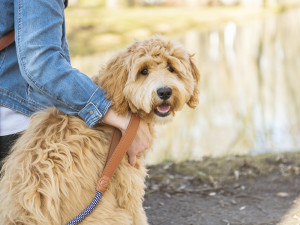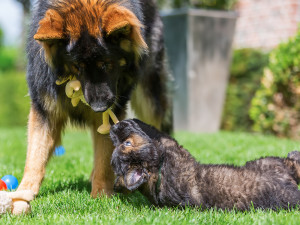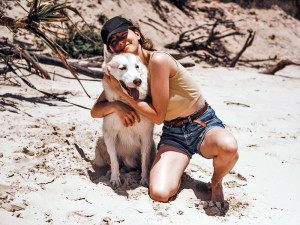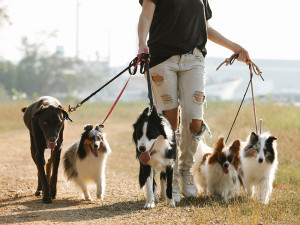12 Red Flags You Should Watch Out For in a Dog Breeder
Look out for untrustworthy breeders – and report them
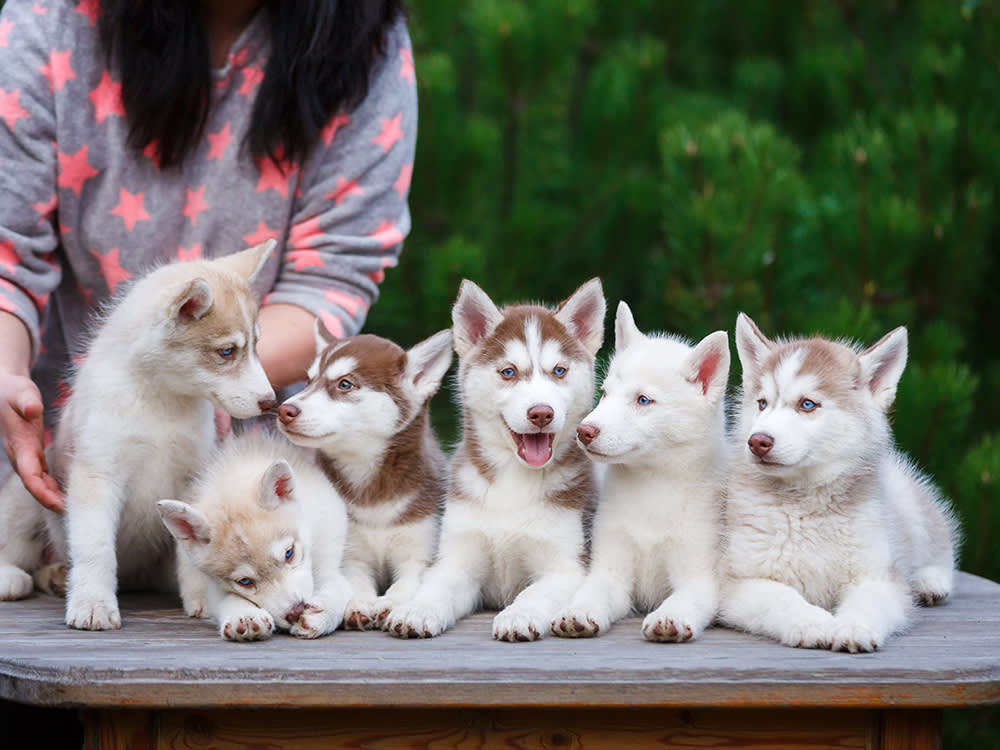
Share Article
With so many animals in need of homes while rescue centres are overcrowded, adopting a dog from a rescue organisation is the responsible and kind choice you can make as a pet-parent-to-be. If you have your heart set on a specific breed – particularly one that doesn’t typically end up in rescue centres, consider breed-specific rescues. Even if you are on the rescue track, you might still become aware of breeders who aren’t on the up and up.
One problem with breeding is that it is very much a business, which means you can get into business with the wrong people. That includes straight-up scammers: during the 2020 pandemic-puppy craze, for example, pet-scam complaints tripledopens in a new tab from the year before, when not as many people were looking to add a pet to the family. There are also puppy mills, aka breeders who pump out as many litters as possible to make as much money as possible. And then there are ‘backyard breeders’ who either don’t know what they’re doing, don’t take great care of their dogs, or pretend to be legit and reputable when they’re not – or in many cases, all of the above.

littleKin™ is Kinship’s home just for puppy and kitten parents. Bop over to check out expert advice, new pet tools, and special deals—all curated for your newest family member.
opens in a new tab That’s not to say that there aren’t plenty of great, trustworthy breeders out there (who, by the way, are just as frustrated with the not-so-nice people selling puppies under false pretences or for the wrong reasons), says Brandi Hunter Munden, the vice president of public relations and communications at the American Kennel Club opens in a new tab(AKC).
Watch for these 12 red flags that suggest you might have happened upon an untrustworthy breeder.
They don’t know much about the breed
“Good breeders are a resource base, a wealth of knowledge about their breed,” says Munden. Potential parents should be able to ask them a thousand questions (literally, if they have that many) about everything from their energy level to common health conditions to how good they are with kids or other dogs. And they will never get annoyed. “A reputable breeder wants you to know every single possible thing about the breed so that their dogs never end up in a shelter,” she says. “The more informed you are, the better they can sleep at night.”
If you encounter a breeder who isn’t forthcoming about the inner workings of the breed, tells prospective parents to do their own research, or gets irritated by their questions, stay away.
They don’t quiz you
“Buying a puppy should involve an interview where the breeder asks you a bunch of questions about your lifestyle, goals for you and your dog, your home environment and more,” says Munden. And they will turn someone down if they believe they aren’t the right fit.
“A good breeder cares more about their dogs having the best life possible than they do about making money off of them,” says Munden. So, if it seems the purchase process could happen rather seamlessly and without questions, take that as a sign that the person is, at worst, a scammer, and at best, not invested in their puppies’ futures.
They’re willing to sell the puppy too early
It used to be that puppies were sold when they were around eight weeks old, but as animal medicine has developed, and we’ve learnt more about canine development, the latest guideline is around 10 weeks old. If anyone tries to sell a puppy at six or seven weeks old, definitely question their integrity – a pup that young should be with their mother or, if not possible, at a veterinary hospital where they can get the care they need.
Again, eight weeks old is now considered a little too young, but if the puppy is coming with vaccines and paperwork, and there are no other red flags (keep reading), it’s not necessarily an end-all, be-all situation, Munden notes.
They won’t communicate on the phone
Reputable breeders want to make sure the dog parents are legit, too, so they’ll call, text or video call them – whatever it takes to get a sense of who they are and to start building a relationship with a prospective parent, Munden says. She adds that anyone who won’t get on the phone with a potential parent is someone they shouldn’t work with.
They have OTT websites
“We keep seeing breeders with elaborate websites and social media accounts post pictures of their puppies next to a designer purse or some other fancy object,” says Munden. “That’s a good indication that they are trying to appeal to a very certain clientele and in it for the wrong reasons.”
Reputable breeders, she says, often have the most basic websites you’ve ever seen, because they don’t care (or need to care) about attracting a certain type of buyer. Same goes for their social media presence: if you only see them post photos of their pups in cute, fashionable settings and never see pictures of their own dogs, you could be looking at a puppy-mill situation, Munden warns.
They won’t take a dog back
Returning a dog is never the goal, but it’s worth asking every breeder what their policy is if the puppy doesn’t work out. “A breeder who is in the business because they wholeheartedly love the breed and care about their dogs will always take one of their own back,” says Munden.
Anyone who doesn’t offer that is someone potential dog parents shouldn’t work with. This would keep a person who couldn’t care less about their dogs’ long-term health and happiness in business.
They have a ton of puppies available at once
OK, this one is a little tricky. It’s certainly possible for a legitimate and reputable breeder to have multiple litters ready at once because female dogs who live together are likely to go into heat around the same time. That said, most respectable breeders will have only a few litters per calendar year so they can keep their breeding dogs as healthy as possible.
There’s no hard-and-fast rule about how many litters is too many litters, but Munden says seeing a waitlist (as frustrating as it may be) is a good sign that the breeder is doing things right and is not in it for the money.
They use The Kennel Club logo with zero backup
Being recognised by The Kennel Club is typically a sign of a reputable breeder but make sure you do your research if they’re making this claim. The Kennel Club has a section on their websiteopens in a new tab that allows you to search for their Assured Breeders.
They don’t do health testing
This is a biggie: breeding dogs should go through genetic testing, and puppies should be medically assessed by a veterinarian for common conditions and breed-specific needs, such as deafness and certain types of dysplasia. Trustworthy breeders will share the paperwork proof with potential parents – Munden advises not to be afraid to ask if they don’t mention it.
If the breeder sounds at all sketchy about providing proof or tells a potential dog parent that the testing is a cost they need to cover, that’s a red flag. For one, their dogs could have undisclosed health problems (they deserve to be loved, too, but their future parents should know what they’re getting in to). And two, if they skipped recommended tests, they likely didn’t work with a vet to ensure they did the whole breeding thing in the safest way for their dogs. Not cool.
They ask to use a payment app
Buying a puppy in person will always beat any digital method. An unreliable breeder usually requests payment via an app like PayPal, which may be legit but make it very hard, if not impossible, to get your money back in light of a scam. “Use a credit card so you can file a claim if you have a problem,” says Munden. Trustworthy breeders will have no problem with that.
They require various travel fees
Again, reputable breeders aren’t in the industry for the money. Any breeder who insists that someone pay for a travel-nanny, a fancy temperature-controlled crate, and other ‘safety precautions’ is likely trying to make as much money off of you as possible, if not an actual fraud, says Munden.
They don’t follow up with you after the fact
This one’s for the people who have already brought their pup home. “Any truly invested breeder will check in with you periodically, especially in the beginning, to make sure you and your puppy are doing well,” says Munden.
Not getting this check-in isn’t necessarily a sign of a bad breeder (people are busy!), but they should want to keep an open dialogue. If that’s not happening after multiple attempts, Munden says it’s time to question the person’s intent and consider warning others.
The kindest and most responsible thing you can do, aside from adopting or fostering, is to spread the word when you spot a fake or suspicious breeder. What’s really at stake is the protection of dogs everywhere, and that’s something we all care about.

Marissa Gainsburg
Marissa Gainsburg is a writer, editor and content strategist who recently traded East Coast humidity for West Coast waterfalls (and wildfire smoke). She lives in Portland, Oregon, with her thru-hiker boyfriend (how cliché) and their freakishly intelligent Aussie, Miley. She previously covered all things wellness and lifestyle as the features director at Women's Health. Her work has also appeared in Cosmopolitan, SELF, and Men's Health.
Related articles
![An English bulldog resting on a floor.]() opens in a new tab
opens in a new tabDo English Bulldogs Face Extinction?
One of the most popular breeds in the world is also one of the least genetically diverse, causing huge implications for the breed
![Keanu Reeves and Halle Berry star in John Wick with two German Shepherd dogs.]() opens in a new tab
opens in a new tabWhy You Shouldn’t Get a Dog Breed Because You Saw it in a Film
Even if you do want to live that Elle Woods life...
![Brown dog with white markings standing in leaves]() opens in a new tab
opens in a new tabCan You Identify Dog Breeds Visually?
The truth is breed labels are often wrong
![A woman walking 5 dogs on leashes outside.]() opens in a new tab
opens in a new tabBreed Does Not Equal Behaviour
A study found that a dog’s breed accounts for less than 10 percent of their behaviour
![a boy cuddles a small dog while standing next to a narrowboat]() opens in a new tab
opens in a new tabHow To Be a Great Dog Parent In a Tiny Living Space (From People Who Know)
Whether you live in a small flat, a van or a boat, these pooch and human partnerships prove you can thrive in a small space with your dog
